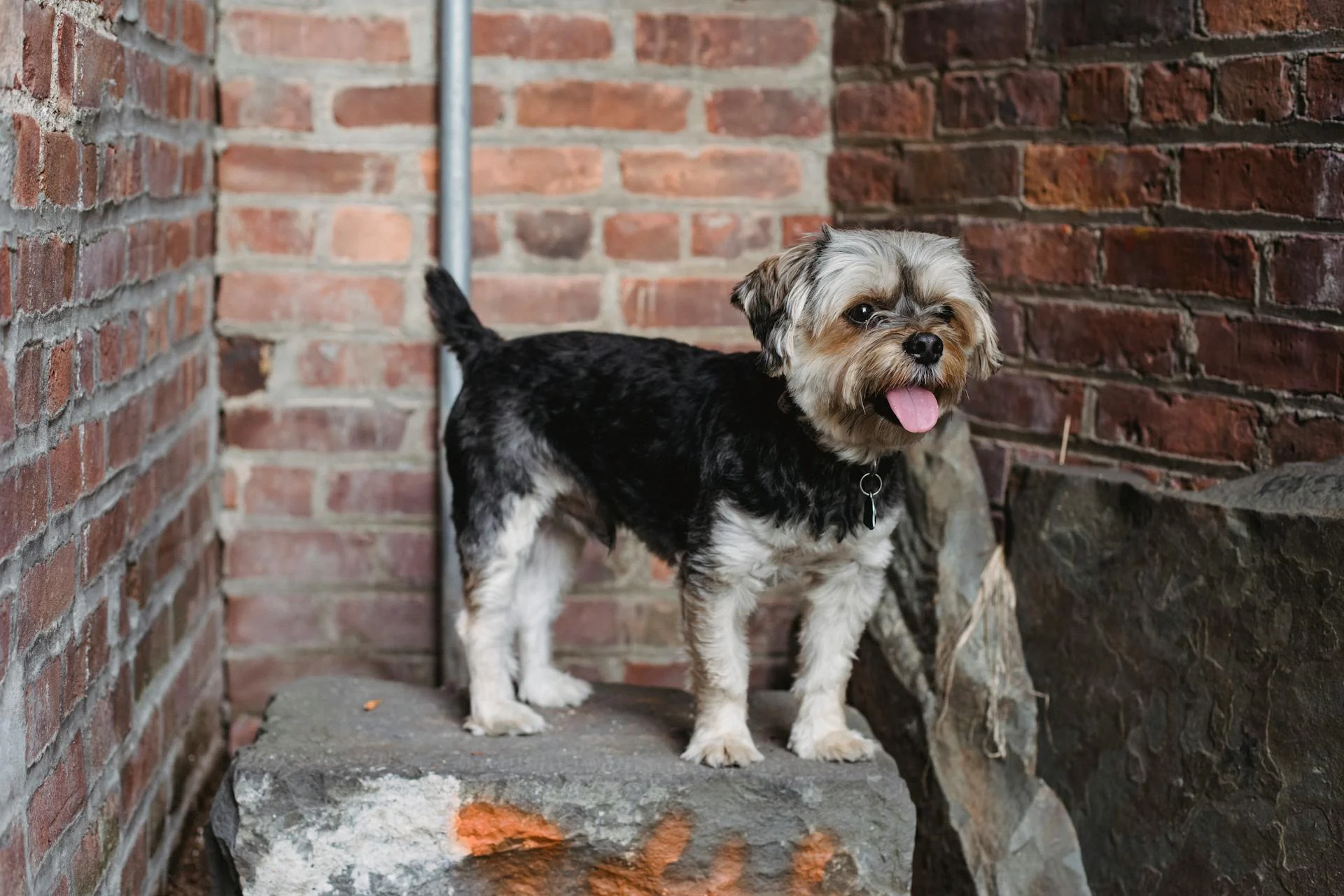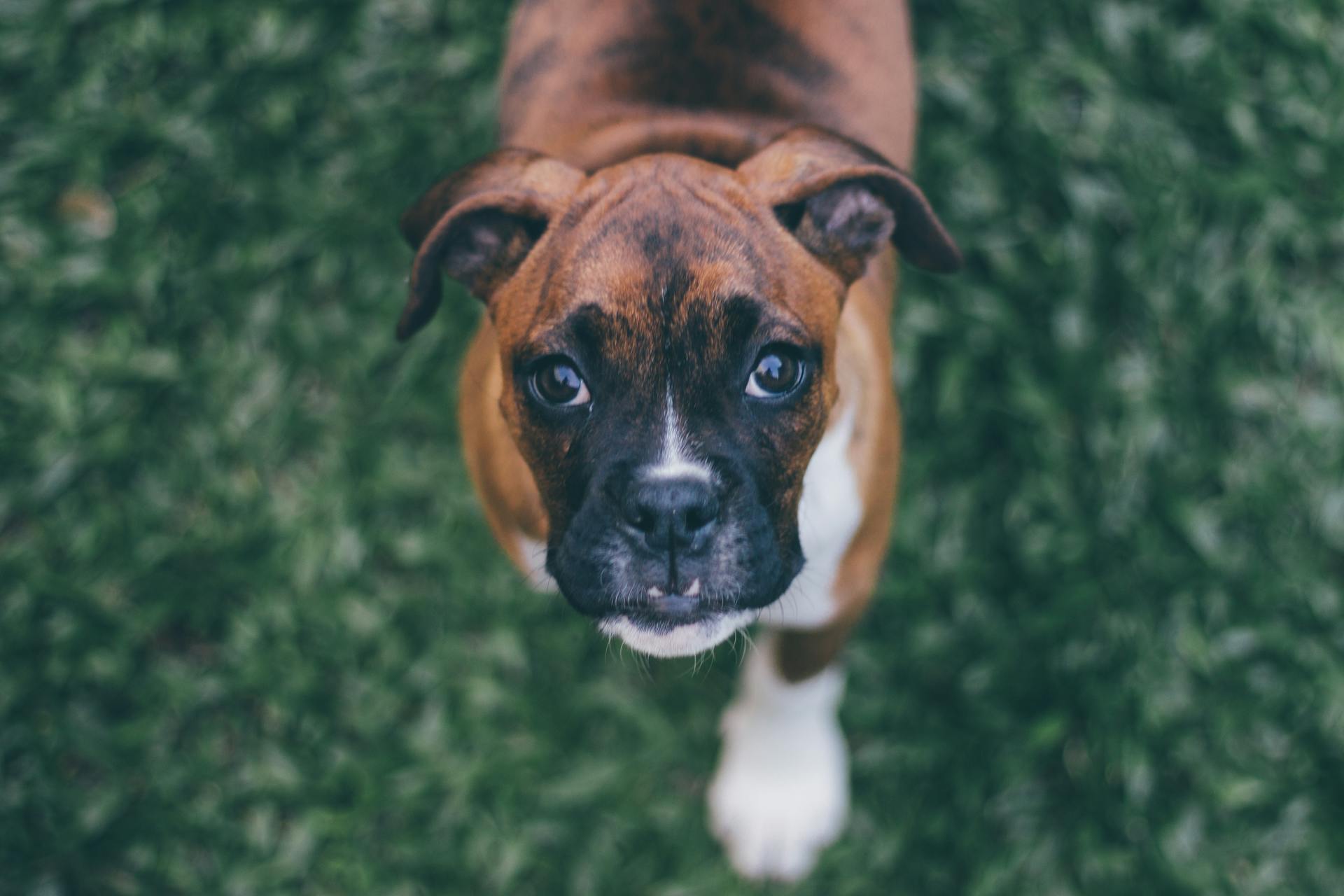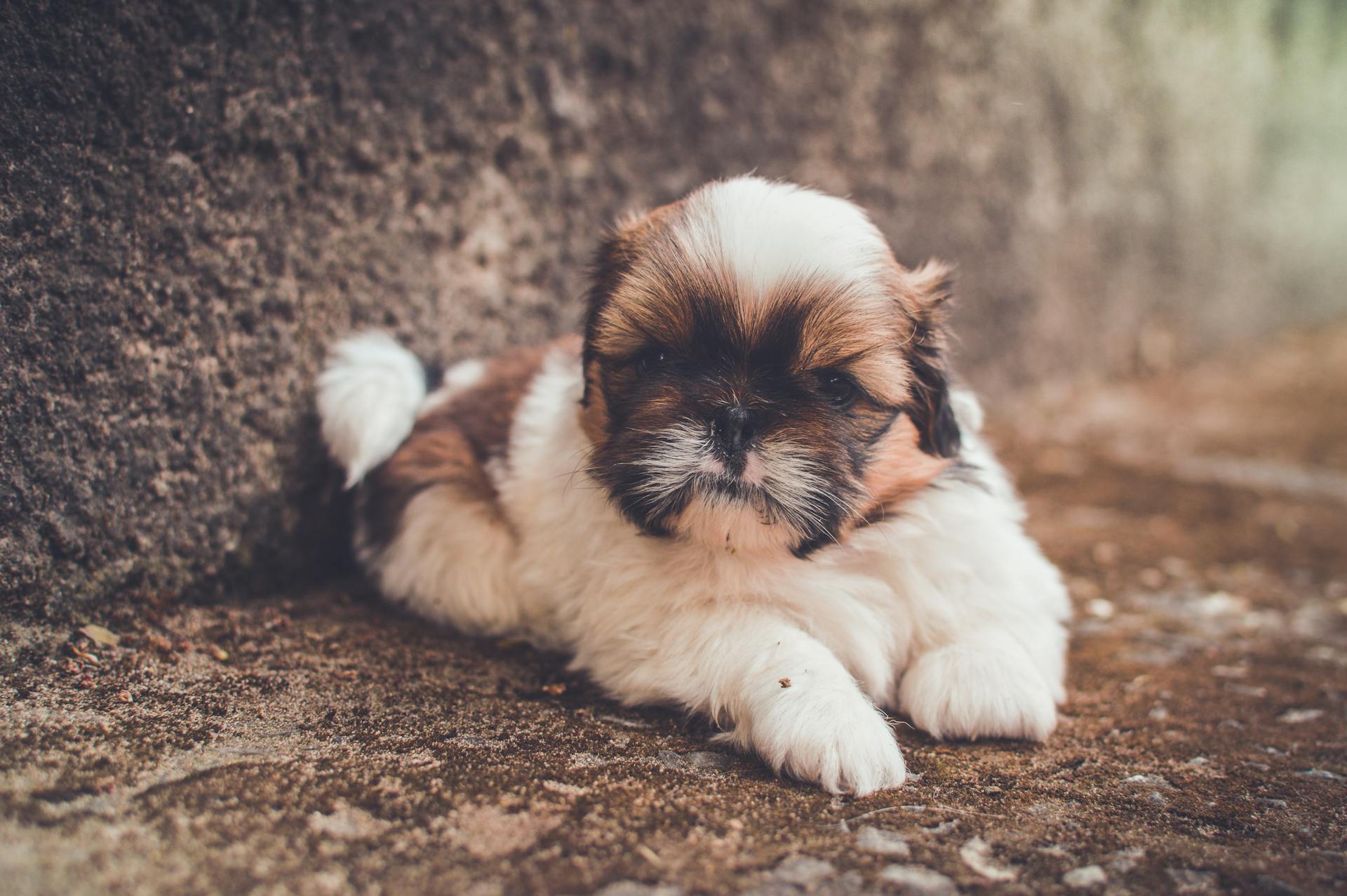
Caring for your Baby Chiweenie is a big responsibility, but don't worry, with the right tips and tricks, you'll be a pro in no time.
Baby Chiweenies are born with their eyes closed, so you won't see them open until around 10-14 days old. This means you'll have to rely on your sense of touch to get to know your new furry friend.
First-time owners often wonder how often to feed their Baby Chiweenie. The good news is that Chiweenies are small, so they don't need a lot of food. Feed your Baby Chiweenie 3-4 times a day until they're about six months old.
Keep an eye on your Baby Chiweenie's weight, as they can get overweight easily. A good rule of thumb is to feed them according to their breed size and age.
You might like: Is a Pomeranian a Good Dog
Breed and Mix
The Chiweenie is a unique breed that's a mix of a Chihuahua and a Dachshund.
Their small size, typically weighing between 2-8 pounds, makes them a great companion for apartment dwellers.
These tiny dogs require regular exercise, but a daily walk or playtime should suffice.
Their short coats are easy to maintain, requiring only occasional brushing.
Their intelligence and trainability make them responsive to positive reinforcement training methods.
They can be wary of strangers, so early socialization is crucial to help them become confident and friendly.
Their small size also means they can be prone to health issues, such as hypoglycemia and patellar luxation.
With proper care and attention, however, they can live a long and happy life, up to 12-16 years.
Health and Care
As a new baby Chiweenie owner, it's essential to know that these adorable dogs can be prone to some health issues. Patellar Luxation, Intervertebral Disc Disease, and Color Dilution Alopecia are some of the health concerns you should be aware of.
Regular veterinary checkups are crucial to detect any health concerns early. Your vet can help you develop a care routine that will keep your dog healthy. It's also important to keep an eye on your Chiweenie's weight, as they can gain weight easily.
Here are some common health problems Chiweenies suffer from:
- Hypoglycemia (low blood sugar)
- Diabetes
- Degenerative disc disease
- Dental issues
- Hypothyroidism
- Knee and joint issues
- Allergies
Maintaining good oral hygiene is crucial, as small breeds are prone to dental issues. Brush your Chiweenie's teeth daily, as recommended by your veterinarian.
Health

Chiweenies are generally healthy dogs, but like any breed, they can be prone to certain health issues. Hypoglycemia, also known as low blood sugar, is a common problem in Chiweenies due to their small stomach.
Dental issues are another common problem among small dog breeds like Chiweenies. Regular teeth brushing and professional cleanings can help prevent these issues.
Degenerative disc disease can cause serious injuries or paralysis in Chiweenies, so it's essential to limit strenuous activities that put pressure on their spine.
Here are some common health issues that Chiweenies may face:
- Hypoglycemia (low blood sugar)
- Diabetes
- Degenerative disc disease
- Dental issues
- Hypothyroidism
- Knee and joint issues
- Allergies
Regular veterinary checkups can help detect any health concerns early, and your vet can develop a care routine to keep your Chiweenie healthy.
Feeding
Feeding a Chiweenie requires careful attention to their high energy needs. They thrive on a regular feeding schedule to prevent overeating.
A Chiweenie's diet should be formulated for a small breed, taking into account their tendency to gain weight if overfed. Limit their treats to avoid adding extra calories.
You might enjoy: Chiweenie Feeding Chart
As your Chiweenie grows from puppyhood to adulthood, their dietary needs will change, and it's essential to adjust their diet accordingly. You should ask your veterinarian for personalized recommendations.
Their individual characteristics, such as weight, energy, and health, make it difficult to make a specific dietary recommendation without consulting a veterinarian.
Grooming and Coat
Chiweenies have coats that are a mix of their Dachshund and Chihuahua parents' coats and colors. They usually have short coats.
Brown, black, and white are the main colors of Chiweenies. Sometimes their coats are solid, and sometimes they have a mix of colors.
A good brushing per week will probably do to keep their coats clean and healthy.
Physical Characteristics
The Chiweenie's physical characteristics make them a unique and adorable breed. They are small in stature.
Their long bodies and builds are reminiscent of Dachshunds, but they can also inherit the smaller ear size of a Chihuahua.
Their ears can be either long and floppy like a Dachshund's or smaller like a Chihuahua's, adding to their charm.
Coat Color and Grooming
Chiweenies have a unique coat color palette that's a mix of their Dachshund and Chihuahua parents' colors, often featuring brown, black, and white hues.
Their coats can be solid or a mix of colors, and they usually have short coats that are a good choice for allergy sufferers.
A good brushing per week is usually enough to keep their coats clean and healthy.
You'll likely need a coat for your Chiweenie in the winter, and don't forget to apply sunscreen to sensitive areas like the ears, nose, and paws in the summer months.
Longer-coated Chiweenies do exist, but they may not be as allergy-friendly as their shorter-coated counterparts.
Both short and long coats are relatively easy to groom, making Chiweenies a great choice for busy owners.
Readers also liked: Are Yorkshire Terriers Good Dogs
Personality
Baby chiweenies are spunky little dogs, and they'd much rather play a game of fetch than snuggle up for a cuddle session. They have high energy levels and can be quite active.
Their Dachshund heritage has given them a strong prey drive, but many chiweenies seem to have lost this hunting instinct. However, this doesn't mean they won't chase after toys or small objects.
Some people might describe their barking as "yappy", but if you're looking for a watchdog, a chiweenie is a great choice. They'll alert you to anyone approaching your door.
Early training is essential to curb unwanted barking habits, and consistency is key. With an energetic owner who's willing to put in the effort, a chiweenie's loyalty and desire to please can make training a breeze.
They tend to latch onto one family member and can be a bit stubborn at times. House training can be a challenge, but with patience and persistence, it's definitely possible.
In a household with multiple people, a chiweenie may get along with others, but they do demand a lot of attention. A one-person home or a smaller family might be a better fit for these little dogs.
Highlights
Baby Chiweenies are adorable, and if you're considering bringing one home, here are some highlights to keep in mind.
They're small dogs, typically standing 10-12 inches tall at the shoulder and weighing 10-20 pounds, making them a great choice for apartment living.
Baby Chiweenies are playful and affectionate, loving to cuddle and play with their owners. They'll follow you around the house and snuggle up next to you on the couch.
They're also loyal and protective, barking to alert their owners to strangers or anything unusual. This makes them great watchdogs, but it's essential to train them well to avoid excessive barking.
One thing to keep in mind is their grooming needs vary depending on their coat type. Smooth-coated Chiweenies need to be brushed once a week, while wiry-coated and longhaired Chiweenies need to be brushed more often.
Here are some common health issues to watch out for in baby Chiweenies:
- Intervertebral disc disease
- Allergies
- Eye problems
Overall, baby Chiweenies are intelligent dogs that can be trained with positive reinforcement methods. They're relatively low-maintenance, requiring daily walks and playtime, but they don't need a lot of exercise.
Frequently Asked Questions
Is a Chiweenie a good dog to have?
A Chiweenie can be a great pet for singles, couples, or small families with older children, but may not be the best fit for larger families or households with multiple dogs. They're a suitable choice for apartment living, but may require some noise management due to their barking tendency.
How much is a Chiweenie worth?
A Chiweenie's value ranges from under $100 at shelters to $500 for a specialty breed, making them an affordable designer dog option.
How big do Chiweenie puppies get?
Chiweenie puppies typically grow to be 5-12 pounds and 6-10 inches tall. Their adult size is relatively small, making them a great choice for families with limited space.
What is the lifespan of a Chiweenie puppy?
A Chiweenie puppy's lifespan typically ranges from 12 to 16 years, but individual dogs may live longer or shorter lives. With proper care, your Chiweenie can enjoy a long and healthy life.
Are Chiweenies a one person dog?
While Chiweenies can form a strong bond with one person, they can also be loving and loyal to other family members. They're not strictly a "one person dog," but rather a breed that thrives on attention and interaction.
Featured Images: pexels.com

